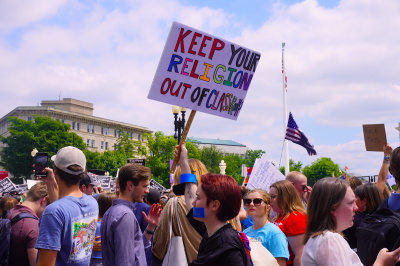Why ending Roe is good for every American

In a monumental development, the Supreme Court overturned the Roe v. Wade decision legalizing abortion in all fifty states. This is incredible news. Roe v. Wade, an environmental disaster on the moral ecology of our nation, harmed society in general and women in particular.
Roe is widely recognized as the most controversial court decision in recent history, as it ruled that an entire class of human beings — unborn human beings — would be denied the right to life, liberty, and the pursuit of happiness. Roe’s ruling both threatened and diminished the civil rights movement’s gains for this class of individuals.
Roe was fundamentally flawed because it told a lie about reality: that unborn human beings are the property of their mothers. Many pro-choice Americans have argued that the unborn human is a part of the mother’s body, yet this perspective is flawed because the unborn child has his or her own DNA. Other abortion proponents contend that the unborn human is a parasite, yet this perspective fails because the unborn person soon will mature and live on his or her own — if given the chance.
Yet, Roe v. Wade abandoned the part and parasite arguments, and instead opted to view the unborn human as the woman’s property. Under the ruling, the state may not interfere with a woman’s right to dispose of her property unless there is a “compelling state interest” and even then, only after the first trimester.
This perspective is deeply troublesome and especially ironic, given that the United States has supposedly repudiated the view that a human being — such as a slave — could be viewed as property. Indeed, the Court’s view had to be overturned; human beings should never be viewed as property. Rather, they should be viewed as persons who possess the same dignity and rights as every other American.
Yet, Roe v. Wade not only told a lie about reality; it has also eroded the moral foundations of our civic community and numbed our collective consciences. Clearly the Roe ruling harmed unborn human beings who are the weakest and most vulnerable Americans; it robbed them of the opportunity to pursue life, liberty, and happiness. But Roe also inflicted harm on society at large and women in particular.
Roe harmed women by encouraging them to be comfortable with using lethal violence against the human being in the womb. It further catalyzed male tendencies toward irresponsibility and predatory sexual behavior. And in so doing, it exacerbated our society’s trend toward instability in relationships and marriages.
Roe harmed society in myriad ways. It harmed men by stripping them of the ability to protect their own child. It harmed law-governed democracy by teaching citizens that it is morally acceptable to use lethal violence to solve their problems. It undermined America’s system of checks and balances because it bypassed the legislature, made a decision about morality from the bench, and inserted into the Constitution a right that did not exist.
Roe gave America abortion on demand, and thus has wreaked havoc on our society, killing babies and hurting women, men, families, democratic values, and cultural institutions. Instead of reinforcing our natural desire to protect the weakest and most vulnerable among us, it demanded that we adjust our consciences to the use of brutal, lethal violence against them.
As Americans committed to justice, equality, and the rule of law, therefore, we must now find better, healthier solutions for parents who experience unwanted pregnancies and for unborn human beings whose lives are crushed in the process. Therefore, let us ensure that unborn humans are protected in law and welcomed in life. With Roe v. Wade at long last behind us, let us recognize both in law and culture the full dignity and personhood of every American, inside and outside of the womb. And let us neither weary nor rest in this worthy pursuit.
Rev. Robert J. Pacienza is President and CEO of D. James Kennedy Ministries and Senior Pastor of Coral Ridge Presbyterian Church in Fort Lauderdale, Florida. He is the author of the forthcoming book, “The Hope of the World: Christian Cultural Engagement in a Secular Age.”




























